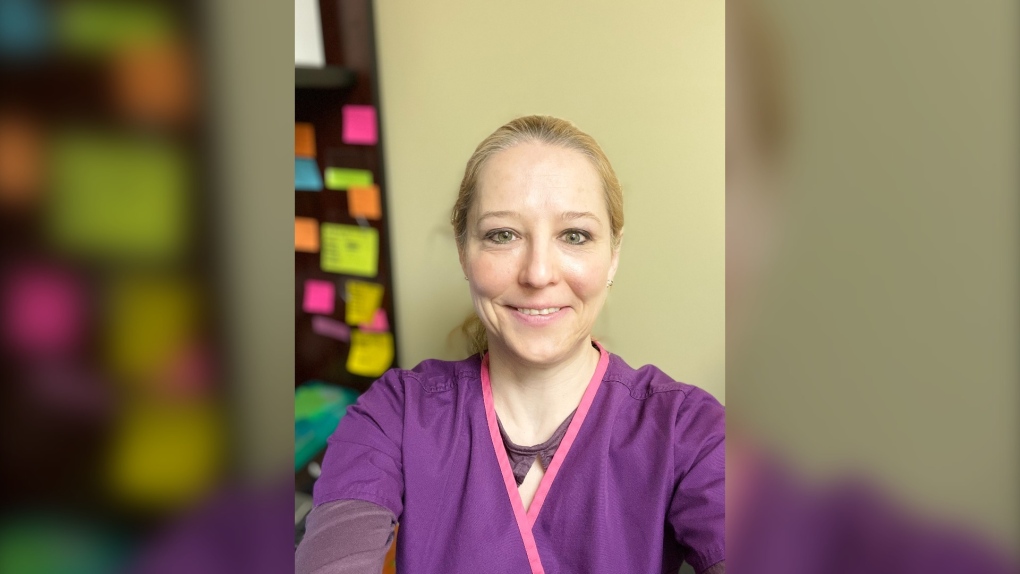Canada continues to be one of the top destinations for immigrants around the world. But the increasing backlogs, exhausting processing times and lack of communication and transparency are causing mounting frustrations among those seeking their Canadian dream.
According to data from Immigration, Refugees and Citizenship Canada (IRCC) published by the immigration news website CIC News, the backlogs have increased to more than 2 million applications across all categories in April, compared to 1.8 million in March.
CTVNews.ca received over 100 responses to our callout from people caught up in this backlog, from those facing delays in visa processing times to those waiting to become permanent residents.
Meghrajsinh Solanki, a business and compliance analyst based in Windsor, Ont., is one of the two million applicants still in limbo. He’s been waiting nearly three years on his family’s permanent residence application. In September 2019, he and his wife applied under the Canadian Experience Class (CEC) program designed for skilled workers with Canadian work experience.
But Solanki hasn’t heard any updates from immigration officials on the status of his application for more than four months and has no idea how much longer he’ll need to wait.
CEC invitations remain paused since September 2021 but IRCC plans on resuming them in early July of 2022.
“We saw so many dreams together to have a good life here in Canada, raise our kids, et cetera. But it’s just been delayed, delayed and yet, we have nothing in hand at all,” he told CTVNews.ca over the phone on Tuesday.
Meghrajsinh Solanki and his wife have been waiting for three years to hear back on their PR application.
While Solanki is living in Canada under a work visa, his wife is still living in India and they can’t be reunited until they receive their permanent resident status. He applied for a visitor visa for his wife in September last year but says it was denied. He has applied again this month and is waiting to hear back.
Solanki says his experience with the Canadian immigration system was so frustrating, he even considered giving up on his application and moving back to India permanently, despite having already bought a house in Canada.
“Of course, no matter how much of a thing that you have, if you don’t have your loved one with you, it just makes no sense to live apart,” he said.
“A PERFECT STORM”
When COVID-19 first hit, IRCC closed many in-person offices and cancelled interviews, citizenship ceremonies, and other appointments, while its staff shifted to working from home.
“I can tell you … that sort of transition to work from home, it’s not easy,” Daniel Levy, a senior attorney at Cohen Immigration Law, told CTVNews.ca in a phone interview.
On top of all that, the federal government introduced new immigration programs that have only added to the already backlogged immigration system.
In April of last year, the government created a new pathway to permanent residency for 90,000 essential temporary workers and international graduates.
Last September, following the collapse of the Afghan government and the takeover by the Taliban, Canada introduced special programs to resettle at least 40,000 Afghan refugees. Back in March, the Trudeau government also introduced the Canada-Ukraine Authorization for Emergency Travel, allowing an “unlimited” number of Ukrainians fleeing the Russian invasion to arrive in Canada on temporary resident visas.
All of this created a “perfect storm” for the ongoing immigration backlogs, according to Stephen Green, a senior partner at the immigration law firm, Green and Spiegel LLP.
“We have an amazing immigration policy. I think we have the best in the world. I really do. But the problem is, we don’t have the ability right now, because of that perfect storm, (to deal with) any increase in numbers,” he told CTVNews.ca in a phone interview. “We’ve got to resolve that urgently.”
CTVNews.ca took a deeper look at the processing time at some of the popular visa categories to understand the timelines of immigration backlogs. Please note these processing times are subject to change as IRCC continues to add fresh data.
Green says there are over 5,000 permanent resident cards currently at the Etobicoke, Ont. immigration center waiting to be distributed and some of these permanent residents are overseas and have been waiting for more than a year.
The time to process PR applications is taking so long that many people are missing their appointments, he says.
Even for permanent residents about to acquire their Canadian citizenship, the processing times have also been dismal, taking an average of 27 months, according to the data retrieved by CTVNews on May 1, 2022.
But for some Canadians-to-be, like Montreal resident Carolina Marcucci, it’s taken even longer. She sent her citizenship application in September 2019 and passed her citizenship exam last August but has no idea when she’ll be invited to take her oath.
“It’s frustrating not being able to communicate with them and not knowing if there a timeline or if I’m going to have to wait for another three years,” she told CTVNews.ca over the phone.
LIVES ON HOLD
The long delays have meant that applicants have to put critical life events and decisions on hold as they continue to wait for a decision from immigration officials.
Processing times are often inconsistent among applicants and for some, like Daniel Bernardes and his wife, who have been waiting nearly 10 months, the process can take much longer.
The couple submitted their application under the Provincial Nominee Program (PNP) last July, but they’ve been waiting for an update since. The backlogs have left this family exhausted, and Bernardes said it has pushed him into depression.
“We had really high hopes when we came here with all the news we get globally about Canada being an inviting country to immigrants, now I am not so sure,” he said.
In 2021, due to their application being in progress, Bernardes had put off visiting his sister and mother-in-law in Brazil, both of whom were struggling with health complications.
“If I’m in Brazil, and (my PR card) arrives in Canada, it’s a huge fiasco because I pretty much get stranded in my home country,” he told CTVNews.ca in a phone interview.
 Daniel Bernardes with his wife, Iva (center) and their daughter Sofia ( left) have been waiting for nearly 10 month to receive an update on their PR.
Daniel Bernardes with his wife, Iva (center) and their daughter Sofia ( left) have been waiting for nearly 10 month to receive an update on their PR.
With restrictions easing this year, Bernardes’ wife booked tickets to see her mother and his sister this summer, hoping that their permanent residency will be approved by then. But last month, both ill family members in Brazil died before she had a chance to say goodbye.
“Although IRCC is not responsible for their deaths, this PR process prevented her from going sooner back home and still seeing her mother alive. Only those who lost someone without being able to say goodbye would understand how sad this is,” he said.
Caroline Haiashi, a health care worker and a mother of two from Hamilton, Ont., had also applied for permanent resident status as part of the new pathway for essential workers. She and her family sent their application last May, but one year later, she’s still waiting.
 Caroline Haiashi, a health care worker and a mother of two from Hamilton, Ont. lives apart from her husband in Brazil and has been waiting for a year for an update on her application.
Caroline Haiashi, a health care worker and a mother of two from Hamilton, Ont. lives apart from her husband in Brazil and has been waiting for a year for an update on her application.
Like many applicants, Haiashi and her kids have had to live apart from her husband in Brazil, who can’t join them until the family has their permanent residency. On top of that, because the family hasn’t gotten their permanent residency yet, Haiashi’s Grade 12 son can’t go to university or college without paying the exorbitant international tuition fees.
“I cannot move my life ahead. And even my son, he wants to start his life in the university or college and we cannot decide without this answer,” she told CTVNews.ca over the phone. “We are getting depressed with this situation.”
LACK OF COMMUNICATION, TRANSPARENCY
For Solanki, the worst part of his experience dealing with Canada’s immigration bureaucracy isn’t the long processing times, but rather the lack of communication from immigration officials on when he can expect an answer.
“The problem is not the wait. The real problem is they are not even letting us know for how long to wait. It is absolutely uncertain and it has made our life uncertain as well because every decision of our life is dependent on that,” he said.
And for Marcucci, she says there have been times when she’s been on hold for two to three hours to try and reach an agent.
“It’s very much impossible to reach any agent,” she said.
Currently, the statistics related to the inventory of cases reflect one moment in time and as applications are finalized and new applications are received every day, these numbers tend to fluctuate frequently.
Alex Fomcenco, an immigration lawyer with Lewis and Associates, says he’s heard countless similar stories. Applicants can try to reach a helpline, but will often end up with a voicemail that says there are no agents available.
“The system is getting worse and worse every day. And you ask yourself if this government lives in a bubble because it is so detached from this reality,” Fomenco told CTVNews.ca in a phone interview.
As someone who is about to become a Canadian citizen, Fomcenco himself is also dealing with the same delays and lack of communication. He has been trying to reschedule his citizenship ceremony for the past two-and-a-half months but has failed to get in touch with anyone. He is now hesitant to visit his son in Denmark, fearing that he might miss any follow-up communication from the IRCC while he is away.
People who start their permanent residency status from abroad have even more trouble reaching an immigration agent and finding answers to their questions. Solanki says when he tried reaching IRCC, they told him that they couldn’t answer any questions about his application and he had to contact the New Delhi visa office through a web form.
Whenever he contacts the New Delhi visa office, the only response he gets is a “not so useful” automated email response, telling him to expect delays due to COVID-19.
It’s a similar story for Quebec City-based PhD student David Brownell, who sent in an application to sponsor his common-law boyfriend from China last July.
But because the application was sent while the couple were living in France, Brownell says IRCC told them that they couldn’t answer questions about their application and the couple had to contact the Hong Kong visa office. Brownell says he’s been met with radio silence every time he fills out the Hong Kong visa office’s web form.
“They don’t get back to us. We’ve both sent several web forms to ask what’s going on and they just don’t reply,” he said in a phone interview with CTVNews.ca.
WHAT’S THE SOLUTION?
In an email statement sent to CTVNews.ca, IRCC’s media relations advisor Rémi Larivière said the backlogs are partly due to closures at various processing offices and visa application centres during COVID-19. Those closures led to longer processing times for applicants, and in part were due to our growing inventory and the number of applications received by IRCC every year, the email said.
Further delays were due to office closures where a number of complex files involving paper applications were impacted. IRCC said that the partners that assist with the processing of complex files had also experienced longer delays than usual.
IRCC continues to struggle with large inventory backlogs and while it slowly tries to plow through the pending pile. The department says it is modernizing and increasing its services for people who want to become Canadians, and this includes online testing, virtual citizenship ceremonies, and an online application tracker to stay updated on their files.
“Despite considerable efforts, we know that some applicants have experienced considerable wait times with the processing of their applications, and we continue to work as hard as possible to reduce processing times,” said Larivière.
The federal government has also committed to putting more resources towards immigration processing. In the 2021 Economic and Fiscal Update, IRCC received an additional funding of $85 million to reduce the wait times for new applications and reduce application inventory backlogs, which Immigration Minister Sean Fraser said will be mainly used to hire more staff.
In its 2022 budget, Ottawa also committed $2.1 billion over five years to support the processing and settlement of new permanent residents to Canada and $317.6 million ongoing in new funding.
Back in January, IRCC expanded its use of advanced data analytics to help IRCC officers to sort and process temporary resident visa applications. The commitment is to improve client service and processes.
But Green remains skeptical over whether the digitization initiatives will do much to ease the frustrations.
He believes a roundtable between business leaders, lawyers, immigration officers and the federal government is urgently needed to tackle the worsening backlogs.
“We’ve got to do it on an urgent basis,” he said. “The economic slowdown — it’s going to be fixed with the intake of temporary workers and immigrants.”
With labor shortages, and with more than one in five working adults nearing retirement, immigration remains key to Canada’s economy, and clearing up immigration backlogs is a step in the right direction.
Green said that the level of frustration amongst applicants is so high that people are going to the Federal Court of Canada in an attempt to force the department to process the applications.
But that’s an expensive and tedious process. A mandamus application is a judicial route that orders IRCC to perform the legal duty owed to an applicant.
According to the IRCC data provided to New Canadian media, 445 mandamus applications were referred by the Federal Court for since 2021 as of Feb 28. The latest figures reveal that the number of people seeking judicial remedies to become new Canadians has grown seven-fold in the past three years.
Levy suggests that Canada should consider implementing premium processing, where applicants or their employer could pay a fee in order to have their application processed faster, as is the case in the U.S. Back in March, the U.S. also expanded premium processing, and provided relief to work permit holders. This was in addition to providing expedited work authorization renewals for healthcare and childcare workers.
“I think Canada should do the same,” Levy said.
Edited by CTVNews.ca producer Phil Hahn















